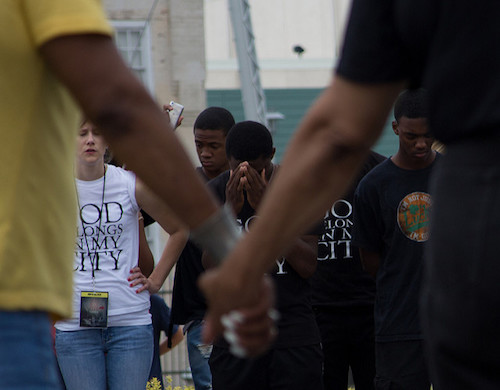We run our website the way we wished the whole internet worked: we provide high quality original content with no ads. We are funded solely by your direct support. Please consider supporting this project.

Why Racial Reconciliation Matters
In Psalm 72, the author prays for a day when “all kings” would “bow down” to God’s anointed and when “all nations” would “serve him” (vs. 11). At this time, the Psalmist continues, God’s king will deliver “the needy who cry out” and save “the afflicted who have no one to help.” He will “take pity on the weak and the needy and save the needy from death.” He will “rescue them from oppression and violence, for precious is their blood in his sight” (vss. 13-15). In other words, God’s future anointed king will do for all people what all tribal kings should have been doing all along. When this happens, the Psalmist concludes, “all nations will be blessed through [God’s anointed king]” and “the whole earth” will “be filled with his glory” (vss. 17, 19).
God made a promise to Abraham (Gen 12) to bless all the nations through him (Gen 12). This Psalm—along with many other such passages in the OT—announces that this promise is to be fulfilled in God’s future anointed king. Through him all the scattered people groups were to be ministered to. Through him all the people groups were to come to know the one true God. Through him people of every tribe, nation and language were to be brought back together.
Of course, the anointed king that this and many other passages are pointing us to is none other than Jesus Christ.
When the New Testament announces that Jesus Christ is Lord of all, it must be understood against this backdrop of the OT motif about uniting those who are divided by racial, ethnic, and national lines. Jesus Christ is not just the Lord, Savior and Messiah of the Jews: he is the Lord, Savior and Messiah of all people. In him, all the prophecies about the reunification and reconciliation of humanity will eventually find their fulfillment. For through Christ a Kingdom is being established that tears down the idolatrous tribal walls of the world and that re-unites and reconciles people together in the love God.
You can see this motif developed in Jesus’ own ministry. While Jesus’ focus was mostly on the nation of Israel, he made it abundantly clear that his ultimate mission was to transcend national and ethnic boundaries and reach the entire world. This much is evident in the counter-cultural way Jesus treated and spoke about non-Jews. And it’s evident in Jesus’ last command to his disciples: they were to go into all nations and make disciples of them (Mt 28:18).
Yet, the motif runs throughout Jesus’ ministry in more subtle ways as well. It’s implied, for example, in Jesus’ reference to “other sheep” that he had that were not “of this sheep pen” [Israel] (Jn 10:16). And it’s evident in Jesus teaching that when he is “lifted up from the earth” (crucified) he will “drive out” the “prince of this world” and “will draw all people to myself” (Jn 12:31-32). The cross that revolts against the powers of darkness also draws people by its beauty and unites them in Christ. The vision of a reunited and reconciled humanity that began with Abraham and is unfolding throughout the Old Testament is in principle fulfilled in Jesus crucifixion.
This vision of a reunified and reconciled humanity beautifully resonates throughout the entire New Testament. For example, John proclaims that Jesus died not just “for our sins…but also for the sins of the whole world” (I Jn 2:2). So too, in the Apocalypse John records the angels singing to the lamb that he is worthy “because you were slain, and with your blood you purchased for God members of every tribe and language and people and nation” (Rev. 5:9).
Paul refers to Jesus as “the second Adam” (1 Cor 15:45). As the first Adam was the founder of the first human race, so the second Adam is the founder of the new human race—the race that will finally fulfill God’s dream of having a Trinity-reflecting unified humanity. In Christ, the idolatrous division introduced by the rebellion of the first Adam shall be completely abolished. In Christ, Paul says, “[t]here is neither Jew nor Gentile…” (Gal. 3:28).
From the reading of these passages, it is clear that racial reconciliation is anything but a nice addendum to the Gospel or evidence of political correctness creeping into the church. To the contrary, the reunification and reconciliation of the scattered people groups lies at the heart of God’s program for the world. It therefore lies at the heart of the Kingdom God has unleashed into the world and thus lies at the heart of what we’re supposed to be about!
The call to preach and pursue racial reconciliation is as important as the call to preach and pursue everything else Jesus died for. We can no more refrain from preaching reconciliation than we can refrain from preaching (say) the forgiveness of sins. And we must therefore consider anyone’s refusal to proclaim and pursue racial reconciliation to be as heretical as we would deem the refusal to proclaim and work for people being forgiven of their sins.
It really is that serious!
Photo credit: ksunderman via Visualhunt.com / CC BY
Category: General
Tags: Good News, Jesus, Kingdom Living, Kingdom of God, Racial Reconciliation, Unity
Topics: Ethical, Cultural and Political Issues
Related Reading

The Kingdom of God While Mowing the Lawn
The Kingdom of God is first and foremost characterized by the kind of love Jesus demonstrated on Calvary and throughout his life. Everything we do, Paul says, is to be done in love (1 Cor. 16:14). Love is the only thing that ultimately matters (Gal. 5:6; cf. I Cor. 13:1-3). As our lives become a…

Sermon Clip: Generic God
“Let’s all just get along.” Is this what God and religion are really about? All we have to do is just be good to people? Almost all religions can agree on this, but it is a generic view of God. In this clip from Greg’s latest sermon, he talks about this generic view of God…

Getting Honest about the Dark Side of the Bible
Eddy Van 3000 via Compfight While most of the Bible exhibits a “God-breathed” quality, reflecting a magnificently beautiful God that is consistent with God’s definitive revelation on the cross, we must honestly acknowledge that some depictions of God in Scripture are simply horrific. They are included in what is sometimes called “the dark side of…

Cross-like Love and Non-Violence
Cosmo Spacely via Compfight Though it seems to have been forgotten by many today, the cross wasn’t simply something God did for us. According to the NT, it was also an example God calls us to follow. Hence, after John defined love by pointing us to Jesus’ death on the cross on our behalf, he…

Jesus Came to Bring a Sword?
Jesus said: “Do not suppose that I have come to bring peace to the earth. I did not come to bring peace, but a sword” (Mt 10:34). Some, both modern scholars along with church leaders since the fourth century, have used this passage as evidence to argue that Jesus is not altogether non-violent. When we…

